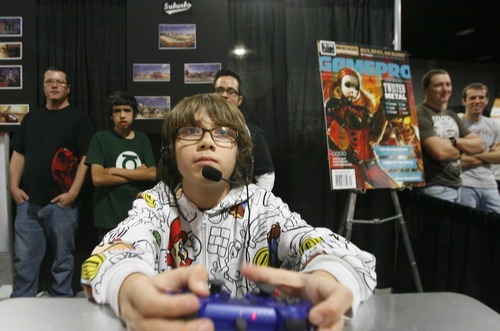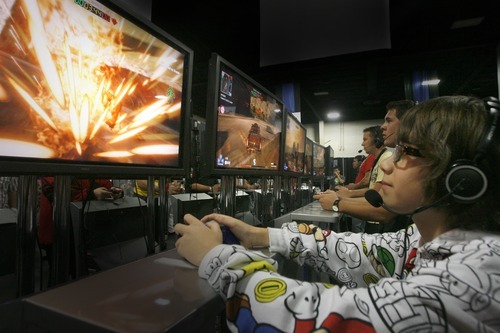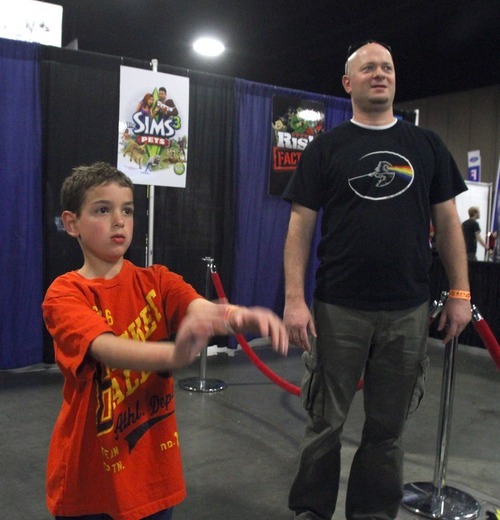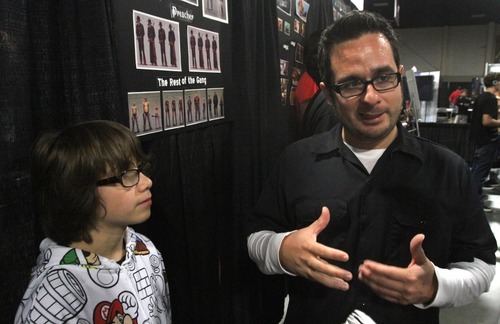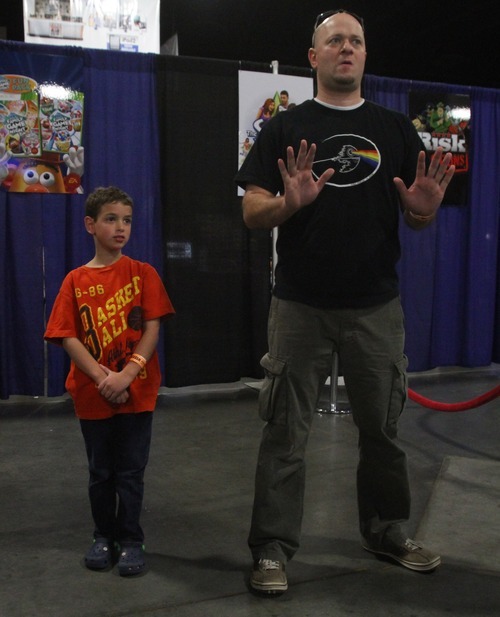This is an archived article that was published on sltrib.com in 2011, and information in the article may be outdated. It is provided only for personal research purposes and may not be reprinted.
Is profanity the equivalent to marijuana — one is considered a gateway to harder drugs the other a gateway activity to violence?
A study from The Church of Jesus Christ of Latter-day Saints-owned Brigham Young University suggests so.
BYU researchers found that middle school students who watched TV and played video games with profanity were more likely to use profanity. And dropping swear words was in turn related to being physically violent and aggressive in how they treat others.
The results were published Monday in the American Academy of Pediatrics' peer-reviewed journal Pediatrics.
"It's not like you hear profanity in the media and go and punch somebody. I think of it as a trickle-down effect," said Sarah M. Coyne, a BYU assistant professor of family life and lead author of the study. "It represents a lack of respect for parents or whoever you're using it towards. It's like a slippery slope. You start using it, and it becomes associated with other aggression."
The findings, which show a correlation, but not a cause and effect, support the use of the ratings provided by the TV and video game industries of their programs' content and age-appropriateness, the article says.
However, Coyne and others say the industries could do a better job of warning about language, especially in light of the study findings.
"Clearly kids learn language that is acceptable and unacceptable from the seven to 11 hours they spend every day with media," said Vic Strasburger, a professor of pediatrics at the University of New Mexico and lead author of the AAP's 2009 policy statement on media violence.
He reviewed the BYU study and recommended it be published because there are so few studies about profanity in the media.
"I don't think you'd find a person in America who thinks language on TV and in movies is better than it was 20 years ago. There are words on prime-time TV that would never be used 10 years ago," he added.
The conservative media watchdog group Parents Television Council backs that up. It tracked a "significant" increase in the instances and harshness of profanity used on prime-time entertainment programs on the major broadcast networks between 2005 to 2010.
Counting 1,438 instances of profanity — from "crap" to "suck" — it calculated a 69 percent increase in profanity with much higher increases in the words "balls," "screw," "boobs" and bleeped out "f-word."
TV networks, says the council's 2010 "Habit for Profanity" report, have "deliberately unleashed literally unparalleled levels of profanity and graphic language upon the public."
Monday's study can serve as a reminder for parents to review the shows and games their children play because the salty language may affect how they talk and act, Coyne said.
Noting that about 70 percent of children ages 8 and older have TVs in their bedrooms — something Strasburger said parents should eliminate — he said parents should watch media with their children and discuss the content.
"So when you hear upsetting language or see upsetting behavior on the screen, you need to say, 'That's not right. That's not what I expect from you.' This really is a family values issue," he said.
Parents found with their children at the Gaming and Electronics Expo, or GEEX, in Sandy on Saturday had different opinions about profanity.
Tom Long, trying out a game called Sorry Sliders with his 8-year-old son Mason, said he doesn't allow Mason to play games with profanity. And when Tom Long plays his more mature games, he uses headphones and doesn't let his kids in the room.
"It would make them more likely to use that type of language. We don't talk that way around our house," said Long, of Draper, adding that profanity shows a lack of intelligence. "Most people are using profanity because they know it's an aggressive thing to do."
But while Jorge Barraza said his 12-year-old son hears profanity on TV and in video games, Mateo doesn't swear even during "live" games, which the father listens in on.
Barraza credits their open dialogue about profanity and violence. "I teach him how when you speak that way, you look more ignorant."
Adds Mateo: "There's no point in it [swearing]."
The various ratings systems for TV, movies and video games take into account images of violence, sexual behaviors, substance abuse and profanity.
But while there have been "hundreds" of studies showing links between exposure to violence, sex and drug abuse and children's subsequent negative behaviors, there may be none on the impact of hearing profanity in media, according to Monday's study.
Coyne's prior research has shown higher levels of aggression in reality shows than other programs, and that girls who play video games with their parents had stronger mental health.
For this study, her colleagues surveyed about 200 teens in a Missouri middle school.
The teens were asked to identify their three favorite TV shows and video games and to rate those programs on their levels of profanity. They were also asked about their beliefs about profanity, how often they swear and their levels of physical or relational aggression (if they gossip to hurt someone, for example).
Because of the LDS Church's admonishment against vulgar language — BYU requires employees and students to use "clean language" — Coyne said she didn't want to survey Utah students. Utah parents, she said, may be more concerned than the general population about media content.
"It's a study coming out of BYU. We wanted people to respect the study," she said.
Even after controlling for the violent content of the teens' favorite programs — which included the games Halo, Mario Kart, Wii Sports, Super Smash Bros. and TV shows ranging from SpongeBob SquarePants to HBO shows — the study showed a "moderate" indirect effect of exposure to profanity on aggression.
"Profanity is often aggressive in itself," Coyne said. "People will use profanity as a way to hurt other people. You can see how you can go on to other types of aggression."
The article, "Profanity in Media Associated with Attitudes and Behavior Regarding Profanity use and Aggression," is co-authored by former graduate student Laura Stockdale, Professor David Nelson and current graduate student Ashley Fraser.
Pediatricians' media recommendations:
Remove TVs, Internet connections and video games from children's bedrooms.
Avoid screen media for infants or toddlers younger than 2 years.
Limit screen time (including TV, videos, computer and video games) to one to two hours per day for older children.
Avoid violent video games (defined as games that include intentional harm to other game characters, including cartoonish or unrealistic violence as well as realistic or gory violence).
Watch shows, movies and play games together and discuss inappropriateness of the depicted scenes.
Source: AAP 2009 Policy Statement — Media Violence.


